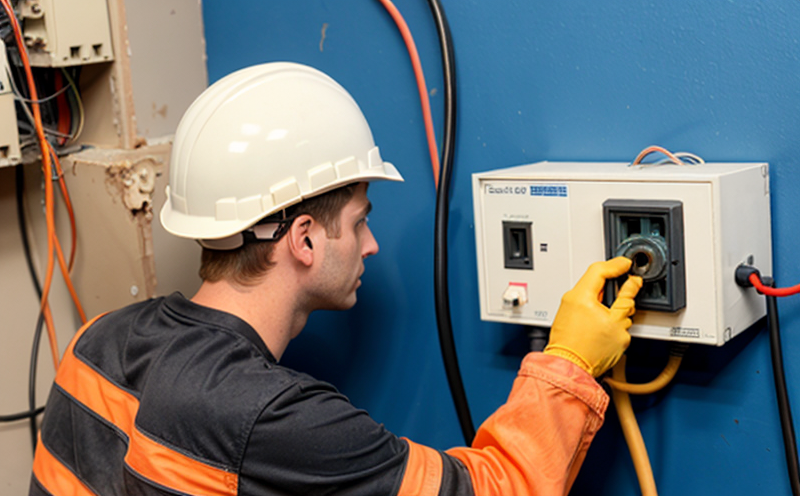IEC 60601-1 Overvoltage Category Testing
The IEC 60601-1 standard is a set of international guidelines that define the essential requirements for electrical safety and electromagnetic compatibility (EMC) in medical devices. One critical aspect of ensuring compliance with this standard involves overvoltage category testing. This service addresses the potential risks associated with overvoltage events, which can compromise the integrity and safety of a medical device during use.
The goal of IEC 60601-1 is to protect patients, healthcare workers, and the public from electrical hazards. Overvoltage category testing evaluates how well a medical device withstands transient voltage surges that may occur in real-world conditions. These overvoltages can arise from various sources such as lightning strikes, switching operations on the power supply network, or electromagnetic interference (EMI).
Overvoltage category testing is essential for ensuring that devices meet the requirements of Clause 12.30 of IEC 60601-1:2018, which covers protection against overvoltages and other transient phenomena. This clause specifically aims to safeguard patients and personnel from electrical injuries due to overvoltage events.
The test involves subjecting the medical device under test (MDUT) to controlled overvoltage conditions that simulate real-world scenarios. The MDUT is connected to a test circuit, which applies high voltage surges in accordance with specified parameters. After each surge application, the performance and safety of the device are evaluated.
The testing protocol includes several stages:
- Initial Testing: The MDUT is subjected to an initial overvoltage condition that simulates a typical transient event. The test checks if the device functions correctly after this surge without any degradation in performance or safety issues.
- Repetitive Overvoltage Events: Multiple overvoltage events are applied consecutively to ensure the device can withstand repeated stress cycles, which is crucial for long-term reliability and patient safety.
- Verification of Safety Features: The integrity of key safety features such as insulation resistance, protective earth continuity, and current limiting devices is verified post-test.
The testing apparatus used in this service includes high-voltage generators capable of delivering precise overvoltage surges. These generators are calibrated to meet the exact requirements specified by IEC 60601-1 standards. The test setup ensures that each device is subjected to controlled conditions that mimic real-world transient voltage events.
After completion, detailed reports are generated summarizing the results of all tests conducted. Compliance with the standard is confirmed if the MDUT passes all specified parameters without any failures or malfunctions. These reports serve as critical documentation for regulatory bodies and internal compliance teams.
The importance of overvoltage category testing cannot be overstated in today's healthcare environment, where medical devices are increasingly integrated into complex hospital infrastructure. Ensuring that these devices can withstand transient voltage surges not only enhances patient safety but also contributes to the reliability and longevity of the equipment.
Industry Applications
- Hospital Equipment: Medical devices such as ventilators, defibrillators, and patient monitors are regularly subjected to overvoltage category testing. This ensures they can safely operate in hospital settings where transient voltage surges are common.
- Clinical Trials: During clinical trials, it is essential that medical devices pass rigorous safety checks including overvoltage category testing. Compliance with standards like IEC 60601-1 ensures the reliability and safety of these devices during trials.
- Retail and Export Compliance: For manufacturers intending to sell their products in multiple countries, meeting international standards such as IEC 60601-1 is crucial. Overvoltage category testing helps ensure that medical devices are safe for use worldwide.
These applications highlight the critical role of overvoltage category testing in ensuring the safety and reliability of medical devices across various sectors.
Eurolab Advantages
- Expertise: Eurolab's team comprises experts with deep knowledge of IEC 60601-1 standards, ensuring precise and accurate testing. Our engineers stay updated on the latest regulatory changes to provide clients with cutting-edge solutions.
- State-of-the-Art Facilities: We have advanced facilities equipped with high-quality testing apparatus that meet international standards. These facilities ensure consistent and reliable test results.
- Detailed Reporting: Eurolab provides comprehensive reports that not only document the results of overvoltage category tests but also offer insights into potential areas for improvement, helping clients enhance their products further.
With these advantages, Eurolab ensures that our clients' medical devices meet stringent safety and reliability standards, fostering trust in both patients and regulatory bodies.
Quality and Reliability Assurance
- Consistency: Our testing process is meticulously designed to ensure consistent results across all tests. This consistency builds confidence in the quality of our services.
- Continuous Improvement: Eurolab continuously invests in research and development to improve our testing methodologies and equipment, ensuring that we are always at the forefront of compliance testing.
Our unwavering commitment to quality and reliability is reflected in every test we conduct. By adhering strictly to international standards like IEC 60601-1, we ensure that our clients' medical devices meet the highest safety and performance benchmarks.





